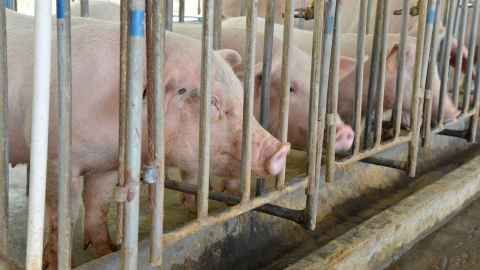Concerns about the continued use of farrowing crates in commercial pig farming have been raised by a new review from the University of Auckland.

There are alternatives to the use of farrowing crates in commerical pig farming that are both more humane for the sows and still financially viable for farmers, according to a new review from the University of Auckland.
Dr Komathi Kolandai, an honorary academic in the University's COMPASS Research Centre, is calling for a shift towards more humane practices that prioritise the well-being of sows in her recent review, published in the Journal of Applied Animal Ethics Research.
"Farrowing crates, which are small, barred metal enclosures that confine sows for up to 35 days while they give birth and afterwards, remain widely used," she says, "despite mounting evidence that alternative systems are much more humane for the animals."
Traditionally, she says, farrowing crates were designed to avoid the sow accidentally crushing her piglets by restricting her ability to roll or suddenly lie down.
However, free farrowing is a system where sows give birth and nurse their piglets in larger, well-designed pens that allow for more natural movement, says Kolandai.
"This approach prioritises sow and piglet welfare by allowing for natural behaviours like nesting, which encourage the sow's instinct to dig a shallow hole and prepare it with straw or hay to create a comfortable 'birthing nest' for herself."
Other systems include temporary crating, where sows are confined for a short period after giving birth but are then given more space and freedom; being individually housed but not confined to a crate; or being grouped together after giving birth, but with access to individual nesting boxes.

Kolandai says that in fact, one Swedish study found lower piglet mortality in a free farrowing situation.
"But the problem is most studies comparing crates with alternatives have not documented the mothers' mortality, " she says.
"In the review, I note that if that documentation is done, we'll most likely see higher sow mortality in crates because of the many reasons they die, which include horrible handling during the birthing process. Some of the reports I read were very harrowing."
She says it's widely accepted that pigs are some of the most intelligent animals on the planet and display a wide range of complex behaviours, as well as the ability to express emotions, including happiness, joy, fear, anxiety and grief.
As such, they deserve better than the miserable, short lives many endure, she believes.
The review calls for a multi-pronged approach to reform, including independent, comprehensive welfare research, improved farming systems and training, policy incentives and stronger legislation and public awareness campaigns to support transitions to more ethical practices.
"There is a clear path forward," says Kolandai. "With the right support and accountability, we can move toward systems that respect both animal welfare and farming viability."
The review considered findings from 24 studies published between 2000 and 2024, two of which were conducted in New Zealand.
The review, 'Doing the Bare Minimum to Ease the Suffering of Animals We Choose to Eat: A Critical Examination of the Status Quo on Alternatives to Farrowing Crates' by Komathi Kolandai has been published in the online August issue of the Journal of Applied Animal Ethics Research.






